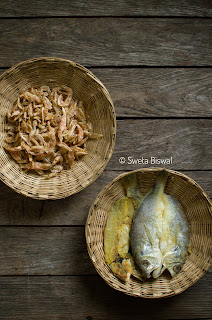Fish preservation itself dates back to ancient times. One of the oldest proof of fish preservation, which is quite difficult to pinpoint since the waste is thrown back into the sea or fed to animals, was discovered at Norje Sunnansund, an Early Mesolithic settlement site. The archaeological site of Norje Sunnansund is dated around 9,600 – 8,600 years before the present and is located in south-eastern Sweden. With climate playing a major role in the preservation techniques deployed across geographies, these Nordic folks resorted to preservation by wrapping up the fish and burying it underground to allow it to undergo a slow process of fermentation.
Elsewhere, fishing communities inhabiting along the coastline would resort to salting and air drying their catch. Researchers have also found that the three main preparation techniques that prevail in today’s fishing communities, regardless of their geographic location –ventral gutting and dorsal cut (bony fish), and filleted straps of meat (sharks)– and that fish-body size influences which method is applied, were applicable in ancient times too. Not much has changed except for the use of hazardous preservatives, a deplorable practice that has seeped into commercial fish preservation. So, it is important to make sure where your stock of dried fish comes from.
A good sun-dried or smoked fish retains most of the protein content. It is rich in omega 3 fatty acids and antioxidants. A good source of protein, 100 grams of dry fish is made up of about 80 -85 percent of protein, and contains only about 300 calories. Sea fish especially has been a unique source of minerals like iodine, zinc, copper, selenium, and calcium. In the future, and in face of depleting marine reserves, striking a balance between dry fish supply and human nutritional needs is vital to support the health and well-being of the increasing human population. However, improving the hygiene levels and processes employed in fish drying is very much required if we have to eradicate the stigma associated with the consumption of dried fish. Especially since it is such a 'hands-on' ingredient when fresh ingredients are scarce or priced out of reach. I have been using it frequently during the lockdowns and found it to be one of the easiest ways to add the 'oomph' factor to our everyday meals.
Sharing an easy and delicious dried shrimp recipe -
Piaja Sandha Chingudi Sukhua
Ingredients -
- 2 cups chopped onion flower stalks
- 1 cup chopped baby potatoes
- 2-3 tbsp tiny sundried shrimps
- 2 dry red chilis
- 1/2 tsp mustard seeds
- 2 tsp mustard oil
- 1/2 tsp salt
- 1/3 tsp turmeric
Method -
Soak the dried shrimps in water for half an hour. Drain and wash 2-3 times to get rid of sand and any dirt sticking to it. Squeeze out as much water as you can.
Heat the oil in a wok. Add the shrimp and fry on low flame till crisp, remove and keep aside.
Add the broken red chili and mustard seeds to the remaining oil. Add the chopped baby potatoes and cook for a few minutes before adding the onion flower stalks. Add salt and turmeric.
Cover and cook till the stalks soften up and the potatoes are cooked.
Finally, toss in the fried shrimps. Sauté for a minute before removing from the flame.
Serve with hot rice and dal.
Note - This dish tastes best in the winters when the potatoes are freshly harvested and the onion flower stalks are still tender.










